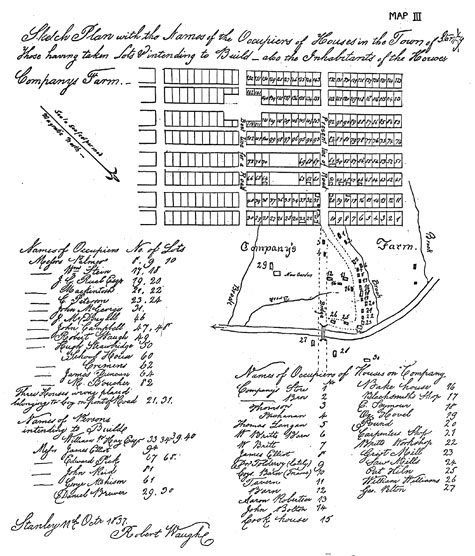

Elliott, Bruce, 2004-2005: Emigrant Recruitment by the New Brunswick Land
Company: The Pioneer Settlers of Stanley and Harvey.********************************************************************************
Most were allocated lots either side of the Stanley Road, just south of the Company's townsite, though Robert Waugh the schoolmaster, James Duncan, and Jonathan McDougall, a shoemaker, occupied houses in the Stanley town plot in 1837. (55) The settlers rented their properties at first, (56) but beginning in 1841 many began to purchase, though most took many years to pay off their instalments. (57)
Robert Waugh, "Sketch Plan with the Names and Occupier of Houses in the Town of Stanley", 11 OCtober 1837. Source: NA, NMC 000638.
700 X 819, 72 dpi, 205 k
2536 X 2957, 400 dp,i 2848 k
To justify the transfer of such huge tracts of land to speculative corporations, and to attract settlers inland to their territories, the British North American land companies made substantial infrastructure commitments, and the New Brunswick Company was no exception. Consequently settlers coming onto company lands had higher expectations than those settling on Crown land or buying from individual speculators or earlier settlers. As an inducement, the Company promised to build houses for its early recruits, to have 5 acres already cleared for them, to support them with provisions, and to provide them with remunerative work on local roads. Ordinary settlers enjoyed none of these advantages, except perhaps the last. Arriving with higher expectations, Company settlers felt aggrieved when all these conditions were not fulfilled. This is not the place to go into detail about the arguments that arose between the Wooler immigrants and the Company, but they were well-documented. They were thoroughly investigated for Governor Sir John Harvey in 1837, and a satisfactory compromise was reached in 1838, after the settlers embarrassed the Company by appealing to the House of Lords. (58)
_________________________________________________________________________
(55) Robert Waugh, "Sketch Plan with the Names of the Occupiers of Houses in the Town of Stanley", 11 October 1837, National Map Collection, NMC 638.
(56) The Company was to receive title from the Crown only when "the whole of the purchase money shall have been paid". Realizing that they could not "give a good title to a man who may wish to lease or purchase a village lot or land for a farm because they have none", the Company applied in 1839 to alter the terms of its contract. PANB, RS 344/C/3d, [NBLC] to Sir John Harvey, Fredericton, 2 August 1839.
(57) Don Dixon has published in Generations 22, no. 1 (Spring 2000): 15-25 a useful index to transfers of title from the Company. His list derives from the York County Registry Office grantees index, but the Company, like the Crown, granted deeds only when a lot was fully paid for. Individuals who did not complete their purchases therefore do not appear. The Company's Land Grant Cash Payment Books (PANB, MC 1284, Series MS3) include the names of original and subsequent locatees with dates of original sale agreement and of payments made. Unfortunately dates of assignment prior to deed were seldom recorded, so it is not always clear who was making the payments. Don Dixon suggested that the Company only leased out land before 1844, but a number of the Berwick settlers initiated purchase in 1841, and in that same year several wrote home noting that it was then possible to purchase: CIHM N.21901, 26 ff.
(58) Petition to the Lords: C.O. 188/61, ff. 388-9, NA reel B-15; agreement, 15 June 1838, C.O. 188/60, ff. 149-50, reel B-14. The "English emigrants at Stanley" appear to have petitioned the Commons as well: Durham University Library, Archives & Special Collections, Papers of 3rd Earl Grey, N.B. and N.S. Land Company, GRE/B146/A1-11. Even the CFS boy, John Harvey, wrote home to his mother about how Captain Haynes had "behaved most shamefull" to the settlers. Blackburn, CFS , 245.
